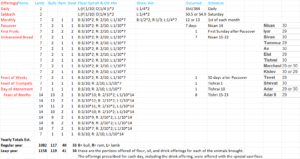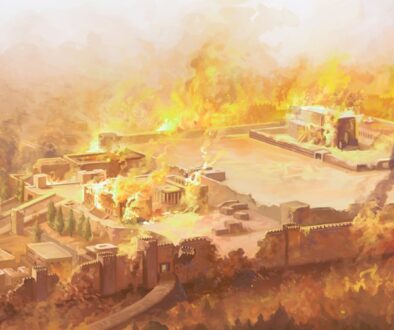Deuteronomy Instructions Pt. 3

Moses continues reminding the people of the instructs God has already given them. They are not to worship like the other nations do. God will choose a place for His name to dwell and the people to worship.
God is telling His people that HE will choose the place for worship. He has already given them the form of worship. Moses will remind them of the different obligations the Lord has set before them concerning worship and remembrance.
A couple other issues figure prominently in the Law at this point. The firs is how they are to treat others in need; slaves. The second concerns divorce. There are reasons that they are allowed to divorce, but restrictions for LIFE in other cases. Some of the marriage and divorce laws speak correction to issues that faced Israel MUCH earlier in her history. Let’s rejoin the people and see where the Spirit of the Lord takes us today.
♥ ♦ ♥
Morning breaks and the people quickly finish gathering the mana the Lord has provided before assembling at the entrance of the Tabernacle. Moses hears their voices and turns his eyes, from observing the morning sacrifice, for a moment. He is pleased that the people have shown great determination to hear the words of the Lord. Today, will be the beginning of the actual statutes, beyond the Ten Commandments. There is MUCH to cover today.
As soon as the sacrifice is burning on the altar, Moses takes his place in front of the people. Once again, Joshua and Eleazar are at his sides. Moses looks out over the congregation and sees their eager faces. Their desire is to learn, or refresh, all that the Lord requires of them in the land they are preparing to inherit.
“It’s time to move into the Lord’s statutes” announces Moses. A deep hush falls over the congregation. None want to miss a single word.
“The Lord has spoken to you at length about the people whom He is driving from this land. How they perverted worship. How they built altars, raised Asheim poles everywhere, and worshiped under every tree that suited their fancy. How they even burned their sons and daughter in the fire as ‘offerings’ to their gods. This in NOT to be so with you! The Lord will choose a place for His name to dwell. A place for this Tabernacle to rest.” Moses gestures with his hand to include the Tabernacle behind him. “In THAT place, you will bring your offerings and sacrifices, according to the instructions that HE gives you. You will NOT build altars in your towns or at your homes. You will bring your offerings to the place HE chooses. And offer them HOW He instructs you.”
“If the place is too far for you to journey to with the actual articles of sacrifice that He has called you to bring, you may sell it and bring the money instead. NONE of that money is to be used for other things, or spent anywhere but the place where His Tabernacle dwells.”
“The tithe is to be brought to the Tabernacle, offered to the Lord, received back, and then used however you please. EXCEPT for every 3rd year. The third year’s tithe is for the Levite, the widow, and the orphan. It is to be stored within each of your cities, to care for those who are poor there.”
“Each of the observances ordained by the Lord are to be celebrated in the place where He chooses for His name to dwell. The Feast of Passover, the Feast of Weeks, and the Festival of Booths will have all of Israel assemble together to commemorate what the Lord has done for you.”
“You will make NO altars in your cities, towns, or villages!” Moses makes certain to meet the eyes of everyone he can after proclaiming this.
“IF ANYONE in your towns, cities, or villages are found to be going after other gods, or enticing others to go after other gods, the charge is to be carefully examined. If found guilty, they are to be brought outside the gate and stoned to death by the people. NO OTHER GODS will be worshiped in the land which the Lord is giving you.”
Moses points to Joshua and Eleazer. “These shall be your judges. The Levites and the judges whom God appoints. THEY will be responsible for finding the truth of matters. By two or three witnesses will a matter be established. These will judge between you when you cannot reach an agreement on your own. Their word WILL stand.”
“There will come a time when you ask for a king. The Lord will be the one to choose this king; not man. There are also statutes that your king must follow. They are designed to keep his heart close to the Lord. The king must be one of your brothers. ‘He must not acquire many horses for himself or cause the people to return to Egypt in order to acquire many horses, since the Lord has said to you, ‘You shall never return that way again.’ 17 And he shall not acquire many wives for himself, lest his heart turn away, nor shall he acquire for himself excessive silver and gold.’” (Deuteronomy 17:16-17)
“And when he sits on the throne of his kingdom, he shall write for himself in a book a copy of this law, approved by[c] the Levitical priests. And it shall be with him, and he shall read in it all the days of his life, that he may learn to fear the Lord his God by keeping all the words of this law and these statutes, and doing them, that his heart may not be lifted up above his brothers, and that he may not turn aside from the commandment, either to the right hand or to the left, so that he may continue long in his kingdom, he and his children, in Israel.” (Deuteronomy 17:18-20)
“When you come into the land that the Lord your God is giving you, you shall not learn to follow the abominable practices of those nations. There shall not be found among you anyone who burns his son or his daughter as an offering, anyone who practices divination or tells fortunes or interprets omens, or a sorcerer or a charmer or a medium or a necromancer or one who inquires of the dead, for whoever does these things is an abomination to the Lord.” (Deuteronomy 18:9-12)
“You will have no need of these practices for the Lord will bring forth prophets, like me, who will reveal the word of the Lord to the people. You asked at Mt. Horeb for the Lord to speak to you through me, for you were afraid. The Lord will continue to speak through His prophets. ‘”And whoever will not listen to my words that he shall speak in my name, I myself will require it of him. But the prophet who presumes to speak a word in my name that I have not commanded him to speak, or who speaks in the name of other gods, that same prophet shall die.” And if you say in your heart, “How may we know the word that the Lord has not spoken?”— when a prophet speaks in the name of the Lord, if the word does not come to pass or come true, that is a word that the Lord has not spoken; the prophet has spoken it presumptuously. You need not be afraid of him.’ (Deuteronomy 18:19-22)” Moses looks to Joshua and nods. He will speak the words of God to the people.
“As you are preparing to go into the land, know this; there WILL be battles. In those battles, the Lord has set standards for you to uphold. These statutes concern the attitude you carry into the battle, who is exempt from going to war, how you approach an enemy, protracted battles, and the results of a concluded battle.”
“When you go out to war against your enemies, and see horses and chariots and an army larger than your own, you shall not be afraid of them, for the Lord your God is with you, who brought you up out of the land of Egypt. And when you draw near to the battle, the priest shall come forward and speak to the people and shall say to them, ‘Hear, O Israel, today you are drawing near for battle against your enemies: let not your heart faint. Do not fear or panic or be in dread of them, for the Lord your God is he who goes with you to fight for you against your enemies, to give you the victory.’” (Deuteronomy 20:1-4)
“Then the officers shall speak to the people, saying, ‘Is there any man who has built a new house and has not dedicated it? Let him go back to his house, lest he die in the battle and another man dedicate it. And is there any man who has planted a vineyard and has not enjoyed its fruit? Let him go back to his house, lest he die in the battle and another man enjoy its fruit. And is there any man who has betrothed a wife and has not taken her? Let him go back to his house, lest he die in the battle and another man take her.’ And the officers shall speak further to the people, and say, ‘Is there any man who is fearful and fainthearted? Let him go back to his house, lest he make the heart of his fellows melt like his own.’ And when the officers have finished speaking to the people, then commanders shall be appointed at the head of the people.” (Deuteronomy 20:5-9) “When a man is newly married, he shall not go out with the army or be liable for any other public duty. He shall be free at home one year to be happy with his wife whom he has taken.” (Deuteronomy 24:5)
“When you draw near to a city to fight against it, offer terms of peace to it. And if it responds to you peaceably and it opens to you, then all the people who are found in it shall do forced labor for you and shall serve you. But if it makes no peace with you, but makes war against you, then you shall besiege it. And when the Lord your God gives it into your hand, you shall put all its males to the sword, but the women and the little ones, the livestock, and everything else in the city, all its spoil, you shall take as plunder for yourselves. And you shall enjoy the spoil of your enemies, which the Lord your God has given you. Thus you shall do to all the cities that are very far from you, which are not cities of the nations here. But in the cities of these peoples that the Lord your God is giving you for an inheritance, you shall save alive nothing that breathes, but you shall devote them to complete destruction, the Hittites and the Amorites, the Canaanites and the Perizzites, the Hivites and the Jebusites, as the Lord your God has commanded, that they may not teach you to do according to all their abominable practices that they have done for their gods, and so you sin against the Lord your God.” (Deuteronomy 20:10-18)
“When you besiege a city for a long time, making war against it in order to take it, you shall not destroy its trees by wielding an axe against them. You may eat from them, but you shall not cut them down. Are the trees in the field human, that they should be besieged by you? Only the trees that you know are not trees for food you may destroy and cut down, that you may build siegeworks against the city that makes war with you, until it falls.” (Deuteronomy 20:19-20)
“I turn now to speak of when one person has power over another. This is either by purchasing another, as a lender to another, taking captive women, or through marriage. All these relationships have a ‘power structure’ where one is ‘master’ over the other. And the Lord watches over those in need of protection.”
“In the case of slaves, you must set your slaves free after six years of service; male or female. You will NOT put them out empty handed, but provide generously for them, as they have served you without the price of having to hire someone to fill the role. If THEY so choose, they may ask to become your servant for life. Then you must mark them as such by piercing their ear with an awl. This is a sign of THEM binding themselves to you; NOT of you binding them to yourself.”
“Every seventh years, ALL debts between your brothers must be released. You cannot require your brother to pay any more than what was returned to you in the seven years. You may, however, continue to hold the foreigner to his debts until fully repaid. You may charge interest of the foreigner, but NOT your brother. If your brother comes to you for help, and it is close to the seventh year, you may NOT withhold help from him. This will anger the Lord. For ‘security’ on a debt, you must care for it diligently. You may not go into your neighbor’s house to collect his pledge, you must wait outside for him to bring it to you. You may not keep the cloak of a poor man as security past sunset. He needs it to keep warm. You may NOT take a mill or the upper millstone as security. This prevents the one who has pledged it from earning a living and is equivalent to taking a life. OPEN YOUR HAND TO THE POOR. The Lord will see this and bless you.”
“For a woman who has been taken captive during battle, if you desire her for your wife, you must take her to your home. She is to shave her head, clip her nails, and change from her ‘captive clothing’. She is to be left alone to mourn for her family for 30 days. Then, you may take her as your wife. IF you become displeased with her, you must release her. She is NOT to be sold or treated as a slave.”
“When you have a wife and hates her and accuses her of not being a virgin when he married her, if her father brings proof, the man must pay restitution for damage to her reputation and cannot ever divorce her. If she is found guilty, she must be taken to the door of her father’s house and stoned to death.”
“If a man no longer loves his wife because he finds some indecency in her, he may give her a certificate of divorce. If she marries another man, who either dies or divorces her, her original husband may not ever marry her again. She is considered defiled.”
Moses diligently covered ALL the Laws that the Lord had given him. By the end of the day, the people had revisited each of the Lord’s statutes and were well aware of what was expected of them. When he had finished giving the last of the Laws of the Lord, he looked out over the people. He could see that they were growing weary. It was time to break for the day.
“We will meet again in the morning. You must ponder in your hearts the words of the Lord that you have heard today. Tomorrow, you must choose for yourselves between life and death. Between following the Lord or turning away from Him. This is a solemn choice that must be entered into with a clear mind and steadfast heart. Return to your tents for the day and consider all the words of the Lord.”
(to be continued)
There are SO MANY “miscellaneous laws” that I couldn’t cover everything. Personally, I would have organized them a little different. I had to keep going back and forth to find bits that fit together with other bits. But I’m NOT God. He ordered it the way HE chose.
I was surprised by a couple of statutes. The laws on tithing was the biggest surprise. I didn’t realize that the giver had their tithe returned to them. Only each third year did they completely surrender their tithe for the use of others. During the other years, they could even “buy strong drink” with the money they received if they sold their tithe, AFTER it was presented to the Lord.
When I was going through Leviticus and parts of Deuteronomy the last time we walked through them, I made a chart of what was offered for each of the festival sacrifices. I included the daily, weekly, and monthly sacrifices too. I’m sharing it with you, just in case you are interested in seeing it all lined out.
Father God, I’m glad I didn’t live in the days of Moses! Even having all the statutes written out for me, I can’t keep up with them. I know I skipped over several of them in my story. I’m praying I didn’t leave out any that someone might need today. THANK YOU that Jesus fulfilled the Law and I’m not under it any longer. So, me knowing every one of Your statutes isn’t critical to our relationship.





